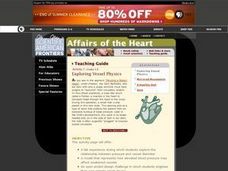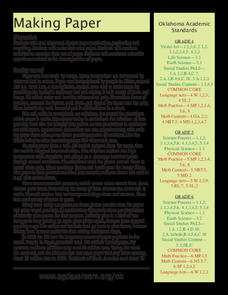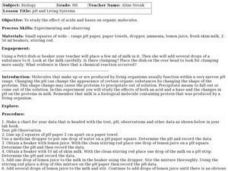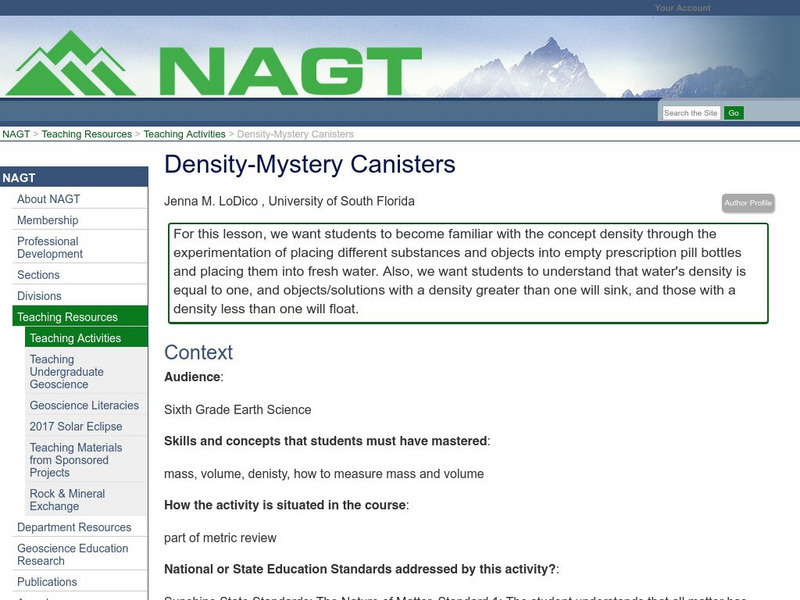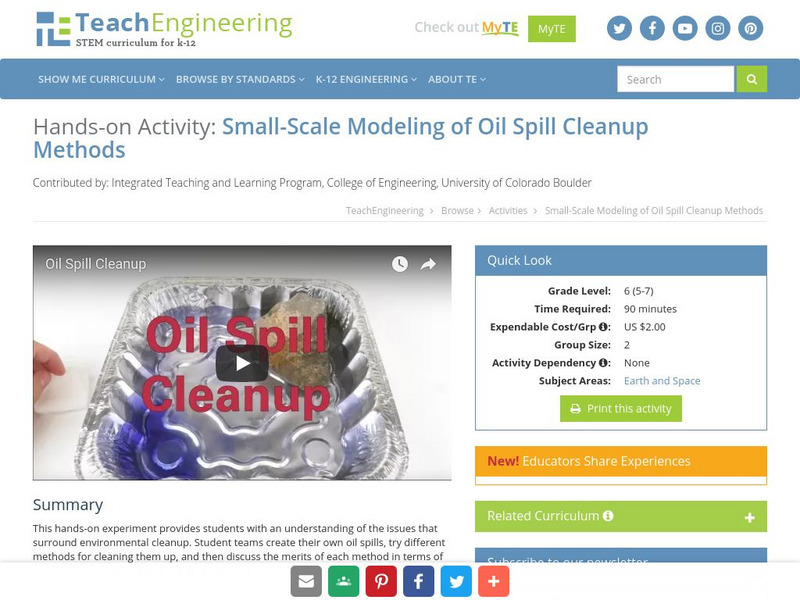Curated OER
Whistle in Progress
Students examine a variety of art projects to stimulate creativity. There are examples for the teacher to follow in demonstrating for a class. It is recommended the instructor use the visual examples on page 1.
Curated OER
Beach Erosion Investigation
Students determine the effects of gentle and strong waves on beach erosion. They use a stream table to simulate a beach and sketch the beach profile after simulated waves of different sizes.
Curated OER
Oobleck
First graders explore Oobleck. They manipulate and observe the properties of Oobleck. Students discuss the differences between solids and liquids. They investigate Oobleck. Students write a sentence describing what they observed about...
Curated OER
PBS - Scientific American Frontier:Affairs of the Heart:Teaching Guide:Exploring Vessel Physics
Young scholars explore the relationship between pressure and vessel diameter. They are given an open-ended design challenge in which they engineer their own remote repair device. Students see a model that represents how elevated blood...
Curated OER
Kernel Power" Ethanol Fuel from Corn
Students study why corn is a biodegradable, renewable resource. In this ethanol lesson students build models and observe a chemical reaction.
Curated OER
Is It Alive?
Eighth graders define the boundaries of living organisms. They determine what makes something a living organism and identify factors that constitute "living." Pupils write a conclusion about the evidence they found that yeast is alive...
Curated OER
Ocean in a Bottle
Learners create an enclosed ocean in a bottle and add different pollutants to explore the effects of pollution on the environment.
Curated OER
Outdoor Art
Students create art projects outside. In these outdoor art lesson plans, students use items in nature to enhance their creativity. They are encouraged to paint rocks, use fences for collages, weave sticks/feathers through picket fences,...
Curated OER
Relief Block Prints
Fourth graders design a space using line and shape and recognize relief block prints from Japan and appreciate their design.
Curated OER
Spring Fever
Students grow plants from seeds that can later be placed in outdoor settings. They care for the seeds while they germinate and begin to leaf out.
Curated OER
Making Paper
Fourth graders investigate the paper usage in their classroom and in other countries by using estimation, counting, and measurement skills. They make paper from recycled paper.
Curated OER
Effects of pH on Organic Molecules
Students investigate the effects of an acid and a base on the structure of milk protein. They observe the changes to droplets of milk when adding ammonia and lemon juice and relate the changes to old, curdled milk. An extension using...
Curated OER
Crazy Putty Ratio
Second graders use knowledge of measurements and ratios to mix various combinations of liquid starch and glue. They chart their ratios, make observations, and write a summary of the activity. They mix their own batch of Crazy Putty to...
Curated OER
Making Paper
Pupils make paper from recycled paper. The student estimates, counts, and measures he amount of paper consumed in a classroom daily. They discover that if we use too much paper, it fills up landfills. Some activities they are doing...
Curated OER
Cells, The Structural and Functional Units of Life
Students observe the general structure and organelles of plant and animal cells. Students prepare microscope slides of elodea, onion, check, and cork and identify the cells by size and shape as unicellular, multicellular, plant or animal.
TeachEngineering
Teach Engineering: Where's the Water?
In this instructional activity, the students will conduct an investigation to purify water. Students will engineer a method for cleaning water, discover the most effective way to filter water, and practice conducting a scientific...
TeachEngineering
Teach Engineering: Can You Catch the Water?
Students construct a three-dimensional model of a water catchment basin using everyday objects to create hills, mountains, valleys and water sources. They experiment to see where rain travels and collects, and survey water pathways to...
Climate Literacy
Clean: Effects of Increased Co2 in the Air on Seawater and Distilled Water
Students perform an experiment comparing the impacts of CO2 on salt water and on fresh water. In a short demonstration, students examine how distilled water and seawater are affected differently by increasing carbon dioxide in the air.
Climate Literacy
Clean: El Nino and It's Impact on the World
The activity takes a hands-on approach to understanding El Nino by physically showing and feeling this weather phenomenon. It consists of an El Nino demo as well as an experiment to be conducted by the students themselves.
Alabama Learning Exchange
Alex: Build a Solar Hot Water Heater
This exercise will allow the students to explore solar energy by building a simple solar hot water heater with clean two liter soda bottles.
TeachEngineering
Teach Engineering: Oil on the Ocean
Students learn about oil spills and their environmental and economic effects. They experience the steps of the engineering design process as they brainstorm potential methods for oil spill clean-up, and then design, build, and re-design...
National Association of Geoscience Teachers
Nagt: Density Mystery Canisters
Students experiment with items that sink or float, and learn that water's density is equal to one, and objects/solutions with a density greater than one will sink, and those with a density less than one will float.
TeachEngineering
Teach Engineering: Is It Safe to Drink?
In this activity, the students will conduct an investigation to purify water. Students will engineer a method for cleaning water, discover the most effective way to filter water, and practice conducting a scientific experiment.
TeachEngineering
Teach Engineering: Oil Spill Cleanup
This hands-on experiment will provide students with an understanding of the issues that surround environmental cleanup. Students will create their own oil spill, try different methods for cleaning it up, and then discuss the merits of...





